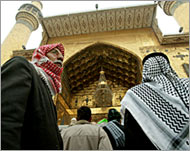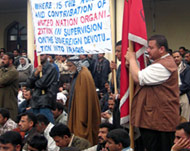Iraq’s Shia flex muscle
Iraq’s Shia population is flexing its new-found political muscles for the first time in decades after being silenced under Saddam Hussein.

In the post-war Iraq theatre, the Shia, who comprise 53% (Source: Encylopaedia Britannica) of the country’s population, are increasingly voicing their intent to play a vigorous role in the country’s political life.
The question is whether the United States, historically uneasy towards Shia Islam following the 1979 Islamic revolution in Iran, will allow them.
The country’s Shia are taking to the streets of Iraq in support of demands by their spiritual leaders for direct elections before the planned US handover of power to Iraqis on 30 June.
“The biggest fear in Washington would be the Iranian influence in Iraq,” said Chris Toensing, Executive Director of Middle East Research and Information Project (MERIP). “They’ll be watching clergy with ties to Tehran or perceived ties with Tehran,” he said.
Not the same
But Iraqi Shias are distinct from their Iranian neighbour, say experts.
“The majority of Iraqi Shia do not want to have an experience similar to Iran,” said Dr Radwan al-Sayyid, a professor of Islamic Studies at the Lebanese University.
“The Shia of Iraq are interested in building a distinctive religious authority opposing Tehran’s,” he said.
The seat of Shia religious authority is in the Iranian city of Qum and Iraqis would like to establish an independent religious base in Najaf, said Sayyid, who is also a graduate of the Azhar University, the oldest Islamic university based in Cairo.
 |
|
The Imam Ali shrine in Najaf, |
But this perception has flown over the heads of many, said Toensing.
“It’s very common in the media to portray the Shia as an ethnic group,” said Toensing. Iraq is often portrayed as if it is comprised of three ethnic groups: Kurds, Sunnis and Shia who all share different backgrounds, history and beliefs, he said.
“This idea was clearly among the neo-cons, who believed that the Shia would rise up and work with British and US forces,” said Toensing.
These neo-conservatives include Richard Perle, Kenneth Adelman and “cheerleaders in the media” like William Kristol and Fuad Ajami, he added.
Caution against oversimplification
Dr Fawwaz Traboulsi, a political science professor at the Lebanese American University (LAU) warned against oversimplifying developments of one group within Iraq.
“The worst thing would be to reduce Iraqis to Arabs, Kurds, Sunnis and Shias,” he said.
“Iraq is a multi-ethnic, multi-cultural country,” he stressed. “Iraq is not reducible to what the Shia will do.”
Washington has stressed that ballot boxes will eventually determine who will lead Iraq.
The United States’ reaction to the outcome of elections will not be determined by the leader’s religion or ethnicity but their outlook on US foreign policy in the Middle East.
 |
|
‘Iraq is not reducible to what |
But Toensing said Washington’s main concerns following elections would include willingness among Iraqis for military bases.
“The neo-cons, the dreamers, would love Iraq to leave OPEC and help the US smash OPEC,” he added in reference to the international oil cartel whose member states determine the price of oil according to their country’s output.
Neighbours’ fate
Some observers believe Washington is banking that a democratic Iraq will lead to the downfall of the ruling clerics in neighbouring Iran.
While Toensing ruled out US military action against Syria or Iran, Washington would maintain a hardline stance.
“They’re hoping by exercising the hardline they can exercise the softline,” he said.
“It’s a very hubristic set of ideas…that the only language Arabs and Iranians understand is the language of force and not the language of diplomacy. That’s essentially what their whole world view is based on.”
In the end, Washington is hoping for an Iraq which will support an speedy end to the Palestinian-Israeli conflict, said Toensing.
“They want Iraq to become like Egypt and Jordan and support the US-sponsored peace process.”
Amman and Cairo signed peace treaties with Israel in 1994 and 1979 respectively and are deeply engaged in finding a solution to the decades-old conflict.